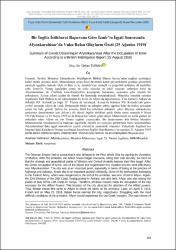Bir İngiliz istihbarat raporuna göre İzmir’in işgali sonrasında Afyonkarahisar’da vuku bulan olayların özeti (25 Ağustos 1919)
Citation
Turan, O. (2022). Bir İngiliz İstihbarat Raporuna Göre İzmir’in İşgali Sonrasında Afyonkarahisar’da Vuku Bulan Olayların Özeti (25 Ağustos 1919) . Afyon Kocatepe Üniversitesi Sosyal Bilimler Dergisi , 100. Yılında Kocatepe-Büyük Taarruz Özel Sayısı , 194-202 . DOI: 10.32709/akusosbil.1172834Abstract
Osmanlı Devleti, Mondros Mütarekesini imzalayarak Birinci Dünya Savaşı’ndan mağlup ayrıldığını kabul etmek zorunda kaldı. Mütarekeden sonra İtilaf devletleri kendi güvenliklerini gerekçe göstermek suretiyle işgallere başladı. Öyle ki Batı ve İç Anadolu’nun stratejik ve jeopolitik noktaları ilk hedefleri oldu. İzmir’in Yunan işgalinden sonra bu istila sürecini en etkili yaşayan yerlerden birisi de Afyonkarahisar idi. Özellikle kara-demiryolları kavşağında bulunması açısından şehir önemli bir noktadaydı. Ayrıca askeri açıdan da önemli bir konumda bulunmaktaydı. Mütareke sonunda yeniden örgütlenen Türk Ordusu’na ait mühimmatın bir kısmı da Afyon’da depolanmıştı. Yine merkezi Ankara’da bulunan XX. Kolordu’ya bağlı 23. Tümen de buradaydı. Konya’da bulunan XII. Kolordu’nun görev yerleri arasında Afyon da vardı. Dolayısıyla bütün bu sebepler şehrin işgalini İtilaf devletleri açısından zaruri bir hale getirdi. Şehrin bu konumu İtilaf kuvvetlerinin dikkatini çekti. Böylece mütarekenin şartlarının denetlenmesi için Afyon’a ilk olarak İngiliz birlikleri geldi. Daha sonra sırasıyla 9 Nisan 1919’da Fransız ve 21 Mayıs 1919’da da İtalyan kuvvetleri şehre ulaştı. Mütarekenin en zorlu şartları ile mücadele eden Afyon en son Yunan işgalini yaşayacaktı. Bu araştırmanın ana teması Mondros Mütarekesinin imzalanmasıyla başlayan işgallerde önemli rol oynayan şehirlerden birisi konumundaki Afyonkarahisar’daki işgal atmosferini çeşitli yönleriyle yansıtmak olacaktır. Çalışmada İngiltere’nin İstanbul’daki Karadeniz Ordusu tarafından hazırlanıp İngiliz Genelkurmayı’na sunulan 25 Ağustos 1919 tarihli askeri istihbarat raporu irdelenecektir. Mevcut rapor konunu da ana materyalini oluşturacaktır. The Ottoman Empire had to accept that it was defeated in the First World War by signing the Armistice of Mudros. After the armistice, the Allied Powers began invasions, citing their own security. So much so that the strategic and geopolitical points of Western and Central Anatolia became their first target. After the Greek occupation of Izmir, one of the places that experienced this invasion process most effectively was Afyonkarahisar. The city was at an important point, especially in terms of being at the junction of highways and railways. It was also in an important position militarily. Some of the ammunition belonging to the Turkish Army, which was reorganized at the end of the armistice, was also stored in Afyon. Again, the 23rd Division of the 20th Corps, headquartered in Ankara, was also here. Afyon was also among the places of duty of the 12th Corps in Konya. Therefore, all these reasons made the occupation of the city necessary for the Allied Powers. This location of the city attracted the attention of the Allied powers. Thus, British troops first came to Afyon to check the terms of the armistice. Later, on April 9, 1919, French and on May 21, 1919, Italian forces reached the city, respectively. Struggling with the most difficult conditions of the armistice, Afyon would experience the last Greek invasion. The main theme of this paper will be to reflect the occupation atmosphere in Afyonkarahisar, which is one of the cities that played an important role in the occupations that started with the signing of the Armistice of Mudros, from various aspects. In the study, the military intelligence report dated 25 August 1919, prepared by the Black Sea Army in Istanbul and submitted to the British General Staff, will be examined. The present report will also form the main material of the paper.
Source
Afyon Kocatepe Üniversitesi Sosyal Bilimler DergisiVolume
24Issue
100. Yılında Kocatepe-Büyük Taarruz Özel SayısıURI
https://dergipark.org.tr/tr/pub/akusosbil/issue/73524/1172834https://hdl.handle.net/11630/10729



















